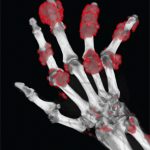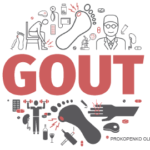 “Pegloticase [a recombinant pegylated uricase§] is often the last remaining treatment option for patients with refractory or uncontrolled gout,” say the authors of a study with newly released 12-month data on the safety and efficacy of pegloticase.1 “Therefore, maximizing the number of patients who have sustained lowering of urate levels during pegloticase therapy is important. Phase 3 trials showed that pegloticase efficacy and safety can be limited by the development of anti-drug antibodies, which have been associated with both a low rate of urate-lowering response (42%) and a high risk of infusion reaction.”
“Pegloticase [a recombinant pegylated uricase§] is often the last remaining treatment option for patients with refractory or uncontrolled gout,” say the authors of a study with newly released 12-month data on the safety and efficacy of pegloticase.1 “Therefore, maximizing the number of patients who have sustained lowering of urate levels during pegloticase therapy is important. Phase 3 trials showed that pegloticase efficacy and safety can be limited by the development of anti-drug antibodies, which have been associated with both a low rate of urate-lowering response (42%) and a high risk of infusion reaction.”
The findings of the long-term data from the randomized, double-blind, placebo-controlled, multicenter efficacy and safety study of methotrexate to increase response rates in patients with uncontrolled gout receiving pegloticase (MIRROR RCT) were recently published in ACR Open Rheumatology. Pegloticase and methotrexate, an immunomodulator, are often prescribed together for patients with uncontrolled gout to help reduce the development of anti-drug antibodies.
Botson et al. compared the 12-month safety and efficacy of pegloticase plus methotrexate with pegloticase plus placebo cotherapy in a double-blind trial. By extending the MIRROR RCT body of data from six months of treatment to 12, this study demonstrated a similar patient response rate and safety profile to the month 6 findings. One hundred fifty-two study participants with uncontrolled gout were randomized 2:1 to receive pegloticase with oral methotrexate (15 mg/week) or placebo. This was followed by bi-weekly infusions of pegloticase (8 mg) with either methotrexate or placebo for 52 weeks.
The researchers found that improvement in the patient response rate remained nearly 30 percentage points higher with methotrexate co-therapy during month 12 (P<0.001). Additionally, data showed a 23 percentage-point increase in the complete resolution of at least one tophus at month 12 (P=0.048), with complete resolution of one or more tophi occurring in 53.8% of patients by week 52. Tophi resolution continued to increase through week 52, suggesting continued therapeutic benefit beyond month 6. No infusion reactions occurred after 24 weeks.
Pharmacokinetic and immunogenicity findings showed increased exposure and lower immunogenicity of pegloticase when administered with methotrexate. These data were consistent through month 12.
According to a press release from Horizon Therapeutics, Kenneth Saag, MD, author of the study, director of clinical immunology and rheumatology at the University of Alabama at Birmingham and a past president of the ACR, stated, “Publication of these 12-month data reinforces key findings shown at month 6, including the durability of urate-lowering response, reduced infusion reactions and reduced immunogenicity of pegloticase when co-administered with methotrexate.”2
According to Dr. Saag, “Urate-lowering efficacy with the co-therapy approach was sustained over time with continued treatment in most patients.”
“The 12-month findings … are consistent with observations through six months and further support [methotrexate] co-administration with pegloticase,” state the authors. “The optimal timing of immunomodulation initiation in relation to pegloticase initiation remains an important question.”1
§About Uricase
“Uric acid is the final product of purine metabolism and is converted to allantoin in most mammals via the uricase enzyme. The accumulation of loss of function mutations in the uricase gene rendered hominoids (apes and humans) to have higher urate concentrations compared to other mammals. The loss of human uricase activity may have allowed humans to survive environmental stressors, evolution bottlenecks, and life-threatening pathogens. High urate levels may contribute to developing gout and cardiometabolic disorders, such as hypertension and insulin resistance, [and] low urate levels may increase the risk for neurodegenerative diseases.”3
Glen K. Rodman is the assistant editor of The Rheumatologist.
References
- Botson JK, Saag K, Peterson J, et al. A randomized, double-blind, placebo-controlled multicenter efficacy and safety study of methotrexate to increase response rates in patients with uncontrolled gout receiving pegloticase: 12-month findings. ACR Open Rheumatology. 2023.
- News release: Long-term data from the MIRROR randomized controlled trial of Krystexxa (pegloticase) injection with methotrexate published in ACR Open Rheumatology. Horizon Therapeutics. 2023 Jul 6.
- Roman YM. The role of uric acid in human health: Insights from the uricase gene. J Pers Med. 2023 Sep 20;13(9):1409.


